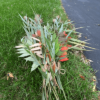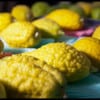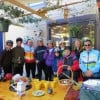Dear Friends, Our rabbis say (Tosafot, Suk. 37b) that when we shake the lulav and etrog on Sukkot, “the trees of the forest sing with joy.” So that got us to wondering, what are the conditions that might allow the trees around us to sing with the greatest amount of joy during this holiday season that just passed? Every year on Sukkot, the US imports upwards of 500,000 lulavim from Israel and Egypt so that we can construct our traditional lulavim bundles using the familiar palm fronds, willow, myrtle, and citron. This combination of species has become so definitional that most of us probably don’t even consider that a lulav could be constructed any other way. But the original text is not so clear. In Torah (Lev 23.40), where we’re first told about the four species, the text simply says: לְקַחְתֶּ֨ם לָכֶ֜ם בַּיּ֣וֹם הָרִאשׁ֗וֹן פְּרִ֨י עֵ֤ץ הָדָר֙ כַּפֹּ֣ת תְּמָרִ֔ים וַעֲנַ֥ף עֵץ־עָבֹ֖ת וְעַרְבֵי־נָ֑חַל וּשְׂמַחְתֶּ֗ם לִפְנֵ֛י יְהוָ֥ה אֱלֹהֵיכֶ֖ם שִׁבְעַ֥ת יָמִֽים׃ On the first day you shall take the fruit of beautiful trees, fronds of palm-shaped trees, branches of woven trees, and valley-willows, and you shall rejoice before YHVH your God for seven days. Nowhere does it determine, at its linguistic core, the […]






